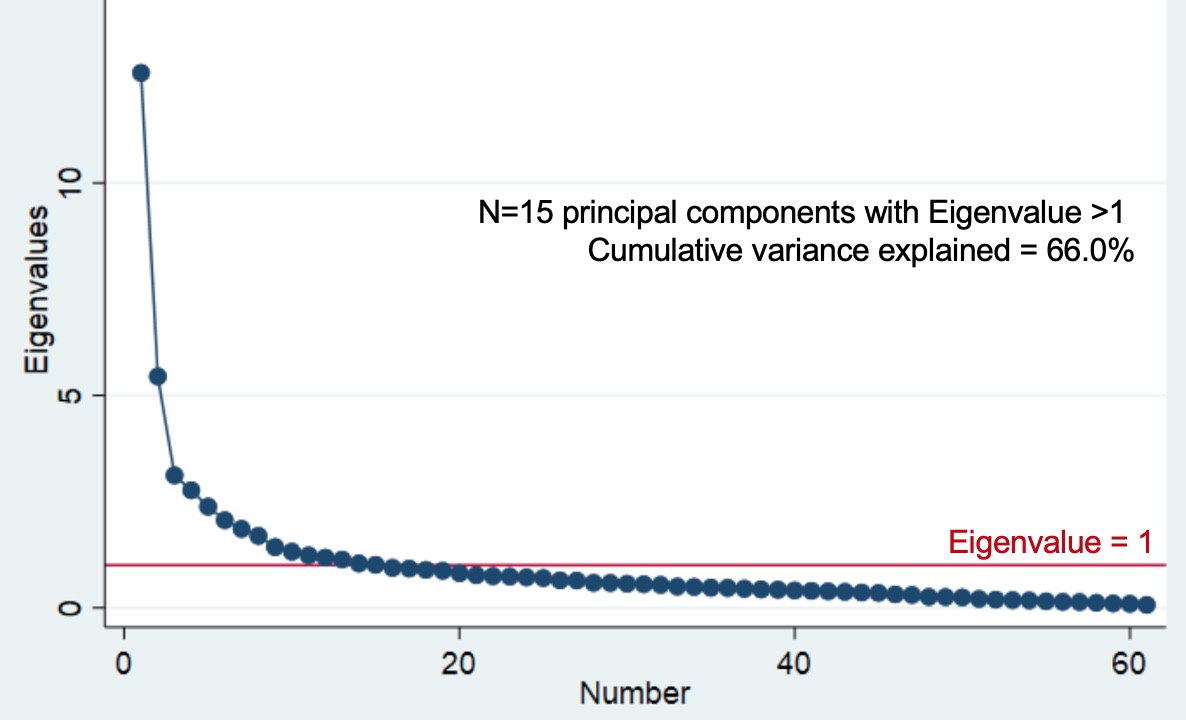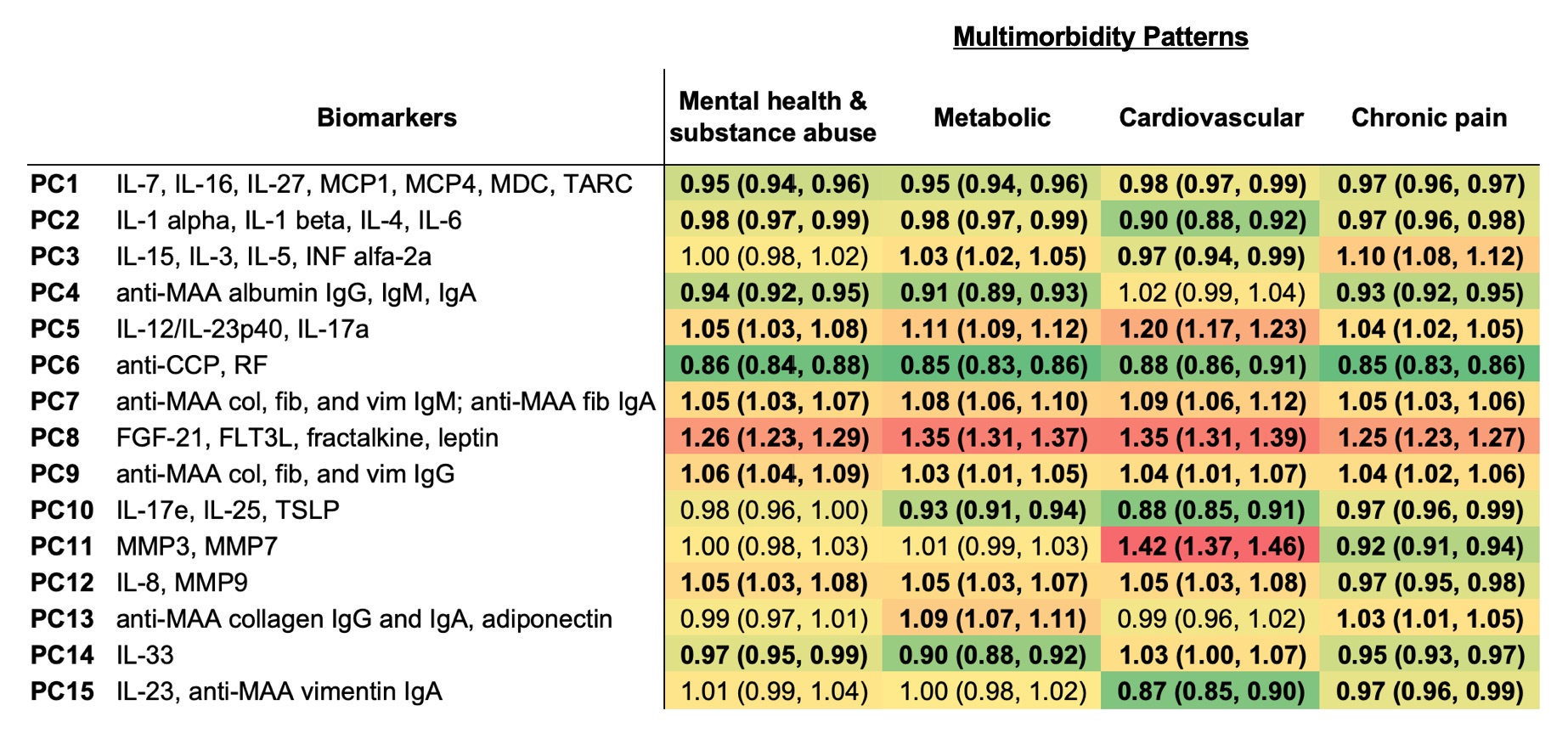Session Information
Date: Monday, November 13, 2023
Title: Abstracts: RA – Diagnosis, Manifestations, & Outcomes II: Comorbidities
Session Type: Abstract Session
Session Time: 2:00PM-3:30PM
Background/Purpose: Rheumatoid arthritis (RA) predisposes affected individuals to develop multiple chronic conditions (i.e., multimorbidity). Mechanisms underlying multimorbidity onset in RA are incompletely understood, particularly for different multimorbidity patterns. We examined how peripheral biomarker profiles encompassing pro-inflammatory, autoantibody, tissue remodeling, and metabolic measures are associated with the clinical expression of distinct multimorbidity patterns.
Methods: From a multicenter, prospective cohort of U.S. Veterans with RA fulfilling ACR classification criteria (Veterans Affairs Rheumatoid Arthritis registry), we measured 61 peripheral biomarkers including 37 pro-inflammatory cytokines/chemokines, 4 matrix metalloproteinases, rheumatoid factor (RF), anti-CCP antibody, 12 antibodies to malondialdehyde-acetaldehyde (MAA), 3 adipokines, and 3 alarmins by the MesoScale platform, ELISA, or nephelometry on serum or plasma from registry enrollment. Principal component analysis (PCA) was performed to generate distinct biomarker profiles (PCs) from log-transformed and normalized analyte concentrations. The presence of forty-four pre-defined conditions at enrollment was determined using diagnostic codes from outpatient and inpatient encounters within linked administrative claims. Four previously developed multimorbidity patterns were then applied (mental health and substance abuse; metabolic; cardiovascular; chronic pain; England et al. Arthritis Care Res, 2023). Cross-sectional associations of PC scores with multimorbidity patterns were assessed using multivariable logistic regression models adjusting for age, sex, race, and smoking status.
Results: Among 2,007 participants with RA (89% male, mean age 64 years), 64% had metabolic, 47% had chronic pain, 21% had mental health and substance abuse, and 13% had cardiovascular multimorbidity. PCA identified15 unique peripheral biomarker PCs with Eigenvalues >1 that together explained 66% of the variance (Figure 1). PC8 scores, primarily characterized by adipokines (FGF-21, FLT3L, fractalkine, leptin), were positively associated with all multimorbidity patterns (aORs range: 1.25-1.35). In contrast, PC6 scores (anti-CCP and RF) were negatively associated with all multimorbidity patterns (aORs range: 0.85-0.88). Cardiovascular multimorbidity was positively associated with PC5 (IL12/IL-23p40, IL-17a) and PC11 (MMP3 and MMP7), but negatively associated with PC10 (IL-17e, IL-25, TSLP) and PC15 (IL-23, anti-MAA vimentin IgA). Several additional associations of smaller magnitude were observed between other PCs and multimorbidity patterns (Table 1).
Conclusion: Biomarker profiles consisting of cytokines/chemokines, MMPs, RA autoantibodies, adipokines, and alarmins were differentially associated with multimorbidity patterns in a large, RA cohort. These findings may indicate shared pathophysiologic mechanisms underlying multimorbidity in RA, such as obesity, metabolic dysfunction, and tissue remodeling. Further, they highlight pathways that could potentially be targeted to reduce multimorbidity burden or prevent its onset.
To cite this abstract in AMA style:
Peyton C, Johnson T, Baker J, Yang Y, Roul P, Duryee M, Poole J, Thiele G, Mikuls T, England B. Comparison of Peripheral Biomarker Profiles Across Unique Multimorbidity Patterns in Rheumatoid Arthritis [abstract]. Arthritis Rheumatol. 2023; 75 (suppl 9). https://acrabstracts.org/abstract/comparison-of-peripheral-biomarker-profiles-across-unique-multimorbidity-patterns-in-rheumatoid-arthritis/. Accessed .« Back to ACR Convergence 2023
ACR Meeting Abstracts - https://acrabstracts.org/abstract/comparison-of-peripheral-biomarker-profiles-across-unique-multimorbidity-patterns-in-rheumatoid-arthritis/


